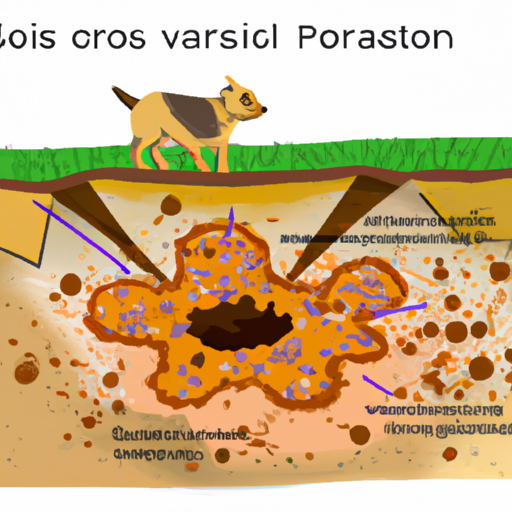Understanding Parvo
Parvovirus, commonly referred to as “parvo”, is a highly contagious virus that primarily affects dogs. The virus is particularly hardy and can survive in the environment for months or even years if conditions are favorable.
How Parvo Spreads
Parvo is spread in two ways:
- Direct contact – Through the nose and mouth when sniffing or licking infected feces or vomit.
- Indirect contact – The virus can live on objects (shoes, clothes, etc.) or surfaces that an infected dog has touched.
The virus can also live in the ground soil for a long time. The most common way that dogs get parvo is by coming into contact with the feces of an infected dog. This can happen in a variety of places like dog parks, sidewalks, or even in your own backyard.
Why the Ground is a Hotspot for Parvo
You might wonder why the ground is such a hotspot for parvo. The simple answer is because of its longevity in the environment. Consider the following:
- Parvo can survive in the ground for up to a year, even in extreme weather conditions.
- The virus can be easily transported from one place to another on shoes, paws, or other objects.
- Dogs are naturally curious creatures and often sniff and lick the ground, putting them at risk of infection.
| Condition | Longevity of Parvo |
|---|---|
| Heat | 6 months |
| Cold | 1 year |
Prevention and Treatment
Prevention is always better than treatment. Here’s what you can do:
- Vaccinate your puppy. Puppies should receive a series of vaccinations starting at 6 to 8 weeks of age.
- Limit exposure. Avoid high-risk areas like dog parks until your puppy is fully vaccinated.
- Keep your environment clean. Regularly disinfect your home and yard to kill the virus.
If your dog gets infected, prompt veterinary treatment is crucial. Parvo is deadly, but with early detection and aggressive treatment, survival rates can be high.
Frequently Asked Questions
Q: Can humans get parvo from dogs?
A: No, humans cannot get parvo from dogs. The virus is species-specific.
Q: How long does it take for a dog to show signs of parvo?
A: Symptoms usually appear within 3 to 7 days after exposure.
Q: Can a vaccinated dog get parvo?
A: It’s rare, but yes. No vaccine is 100% effective. However, vaccinated dogs that do get the disease typically have milder symptoms.
Q: Can parvo be treated at home?
A: No, parvo is a serious illness that requires immediate veterinary care.
Q: How can I disinfect my home if my dog had parvo?
A: Use a bleach solution (1 part bleach to 30 parts water) to disinfect all surfaces, objects, and areas your dog had access to.
In conclusion, it’s vital to regularly vaccinate and monitor your dog’s health to prevent Parvo. A clean environment and avoiding high-risk areas can also significantly reduce the chances of infection.



